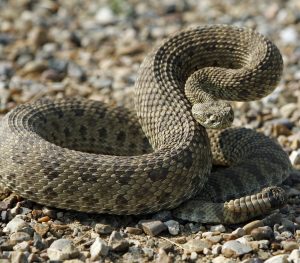Do You Hear What I Hear? Rattlesnake Safety
 Did you know there are rattlesnakes in Colorado? Rattlesnakes are a fact of life around these parts. Most of us are aware of the dangers snakes pose to us as we hike and camp, or even while we putter around in our own backyards. Rattlesnakes and pets are a particularly disastrous combination, thanks to our pets’ curious nature and unpredictability.
Did you know there are rattlesnakes in Colorado? Rattlesnakes are a fact of life around these parts. Most of us are aware of the dangers snakes pose to us as we hike and camp, or even while we putter around in our own backyards. Rattlesnakes and pets are a particularly disastrous combination, thanks to our pets’ curious nature and unpredictability.
Do you know what to do if you and your pet happen across a rattlesnake? Learning about rattlesnake safety for pets is key to protecting your furry loved one.
Rattlesnake Behavior
Having a basic understand of rattlesnakes will you avoid a bite. Rattlesnakes often warm themselves in the sun, hunt, migrate and den in the same areas year after year.
Snakes Are Introverts
Snakes are shy creatures and prefer to be left alone. Rattlesnakes will not act aggressively unless they are threatened.
Rattlesnake Bite
A rattlesnake bite is a serious risk to your pet. Once the venom is injected, it begins to act immediately. The blood vessels near the region of the bite are compromised, and an immune response causes severe swelling and pain. Because the venom also affects the blood’s ability to clot, large amounts of blood may be lost. The effects of the venom will lead to shock, and eventually death, if left untreated.
Pets are most often bitten on the face, neck, forelegs, and paws, since these are the body parts that are typically closest to the snake. There will be progressive swelling, bruising, and intense pain in the area of the bite, and overall weakness may occur due to low blood pressure. Your pet may also start panting.
What To Do If Your Pet Is Bitten
The staff at Lone Tree Veterinary Medical Center, as well as other local animal ER’s, are equipped to deal with snakebites and will do everything possible to ensure a good outcome for your pet. If you can, please call when you are on your way. This helps the medical team prepare for your pet’s arrival. They can also give you any other instructions if needed.
Avoid Getting Bit
Understanding rattlesnake safety will keep you and your pet safe. Before are additions tips:
- Stay on the trail – Snakes love to hide, and can be hard to spot in the brush, tall grass, and rocks alongside a trail.
- Keep your dog on a non-retractable leash. Keep it by your side at all times and stay on the trail while hiking. Avoid letting your dog run free.
- Avoid prairie dog colonies – Rattlesnakes use abandoned prairie dog holes for shelter.
- Be careful around water – Rattlesnakes can swim and what looks like stick in the water could actually be a snake.
- Protect your property – Snakes live on a diet of small animals, mainly rodents, so controlling the rodent population around your property is key in limiting rattlesnakes near your home. Keep your yard free of tall grasses and debris, which can make good hiding places for rodents and snakes alike.
- If you come across a rattlesnake – Back away from the area calmly and quietly, and find a different route. A striking reach of a snake is 5 to 10 feet. Do not attempt to go around it or jump over it.
- Train your dog –A dog that is easy to control poses less of a danger to him or herself, so spend some time reinforcing your dog’s basic obedience skills. Our Canine Academy offers a variety of training and obedience classes for all breeds and ages.
Understanding the basics of rattlesnake safety will keep you and your pet safe.



